Experts optimistic about success in Iran, P5+1 nuclear talks

By Sara Rajabova
Iran and six world powers started new round of expert-level talks in a bid to resolve the disagreement over the implementation of the Geneva deal, inked last November.
The sides had to continue talks both-in high and expert levels because of their failure to achieve any comprehensive agreement after the Geneva deal took effect on January 20.
The deal committed the six countries to ease some sanctions on Iran in exchange for the latter's limiting certain aspects of its nuclear activities during a six-month period. It was also decided not to impose further nuclear-related sanctions on Iran within the same timeframe.
The West expects Iran to prove the peaceful nature of its nuclear program before lifting sanctions against the country. Iran, however, denies all the allegation reiterating that it has no intention to develop nuclear weapon and this is against its national principles.
The U.S. and some of the Western countries want the cessation of the uranium enrichment and closure of Arak heavy-water reactor.
Chief U.S. negotiator, Wendy Sherman, said earlier Iran "does not need" the Fordo site or a new heavy-water reactor at Arak, which concerned the Iranian officials.
Iranian officials have repeatedly said that the uranium enrichment and Fordo site are the red lines for Iran in the negotiations.
Besides, the rhetoric of the sides intended for the internal audience indeed negatively affects the negotiation process.
The sides fail to reach comprehensive agreement, despite they describe the negotiations as "constructive" after every round of talks.
Thus, they seem to take one step forward, two steps back.
On the other hand, they voice intentions to come to an agreement and resolve the dispute over Tehran's nuclear program, which gives optimism for success in the nuclear talks.
Commenting on the issue, senior fellow at Nanyang Technological University's S. Rajaratnam School of International Studies, James M. Dorsey, told AzerNews that there is no difficult quite a long road to travel before an agreement will be reached.
Dorsey said the negotiators have to cope both with domestic opposition as well as with opposition by third parties, including Israel and Saudi Arabia.
He noted nevertheless, all parties have an interest in the negotiations, adding that provides grounds for optimism.
Professor of economics at U.S. Northeastern University, Kamran Dadkhah believes there is about 60 percent of chances for success in these talks.
Dadkhah said if the talks are successful, that is, if the P5+1 become convinced that the Iranian nuclear program is peaceful and the sanctions are lifted, Iran would benefit tremendously.
He also noted that it would be beneficial to other countries as well.
"If Iran builds an atomic bomb, the region will be in turmoil. Saudi Arabia and Turkey would feel that they have to acquire the same weapons. Israel may take preemptory action. Even Russia may feel that it has to do something to protect its allies. All in all the cost to the region and the world would be tremendous. These considerations should prompt all sides to work hard for the success of talks," Dadkhah said.
He pointed out that on the other hand, many inside Iran have benefited from the tension with the West and sanctions.
"Many have amassed astronomical wealth by trying to circumvent sanctions, through commissions and fees for transferring funds to and from Iran, and through smuggling. Furthermore, many owe their political positions to their asserted opposition to the United States and the West. The government and those in power have justified the economic misery of the people and the lack of political freedom by asserting that the country is in a war with the West.
These people will not be happy if the nuclear program is downsized and sanctions are lifted," Dadkhah underlined.
He further noted that besides, many in the West and the Middle East do not believe that Iran's nuclear program is peaceful. "They believe that all these negotiations and agreements are covers for Iran to buy time and carry out its military nuclear program," Dadkhah said.
The expert also said assuming that Hassan Rouhani government is willing and able to curb the nuclear program, convince the P5+1 and lift the sanctions, it has to overcome domestic opposition, and unequivocally demonstrate to skeptics in the West and the region that Iran's nuclear program is peaceful. "It is a tremendous job," he noted.
Here we are to serve you with news right now. It does not cost much, but worth your attention.
Choose to support open, independent, quality journalism and subscribe on a monthly basis.
By subscribing to our online newspaper, you can have full digital access to all news, analysis, and much more.
You can also follow AzerNEWS on Twitter @AzerNewsAz or Facebook @AzerNewsNewspaper
Thank you!
